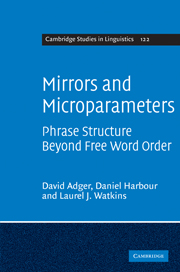Book contents
- Frontmatter
- Contents
- List of tables
- Acknowledgements
- Abbreviations and notation
- Kiowa phonemes and orthography
- 1 Introduction
- 2 Nonconfigurationality and polysynthesis
- 3 The clausal spine
- 4 Making mirrors
- 5 Interface properties of clausal domains
- 6 Anti-quantification and the syntax–semantics interface
- 7 Conclusion
- Appendix
- References
- Index
7 - Conclusion
Published online by Cambridge University Press: 26 January 2010
- Frontmatter
- Contents
- List of tables
- Acknowledgements
- Abbreviations and notation
- Kiowa phonemes and orthography
- 1 Introduction
- 2 Nonconfigurationality and polysynthesis
- 3 The clausal spine
- 4 Making mirrors
- 5 Interface properties of clausal domains
- 6 Anti-quantification and the syntax–semantics interface
- 7 Conclusion
- Appendix
- References
- Index
Summary
With freedoms come constraints. Kiowa is a free word order language displaying the hallmarks of nonconfigurationality. Nonetheless, speakers of Kiowa are not at liberty to put anything anywhere. On the contrary, they conform to three major constraints on word order:
Clausal mirror
particles occur in an order inverse to their associated suffixes
Inverse base effect
XP and YP are introduced by functional heads A and B, where A » B, then the postverbal order is the inverse base order V YP XP
Anti-quantification effect
elements that obligatorily bind semantic variables cannot occur in pre-wh or postverbal position
We believe that such constraints cast a very revealing light on the nature of crosslinguistic parametrization, on the structure of syntactic representations, and on the interfaces of syntax with other modules of the grammar.
We have argued that the distinction between Kiowa and configurational languages, like Italian and English, is not macroparametric but emerges from the confluence of a number of microparametric settings, all familiar from previous work in generative grammar. First, part of the explanation of the inverse base effect and of the clausal mirror centres on whether functional heads have morphological exponents or not. It is, of course, well accepted that a head pronounced in one language can be syntactically active yet unpronounced in another (for example, pro or D). In the context of Mirror Theory, this difference correlates with how unmoved specifiers may be linearized with respect to their heads.
- Type
- Chapter
- Information
- Mirrors and MicroparametersPhrase Structure beyond Free Word Order, pp. 176 - 178Publisher: Cambridge University PressPrint publication year: 2009



